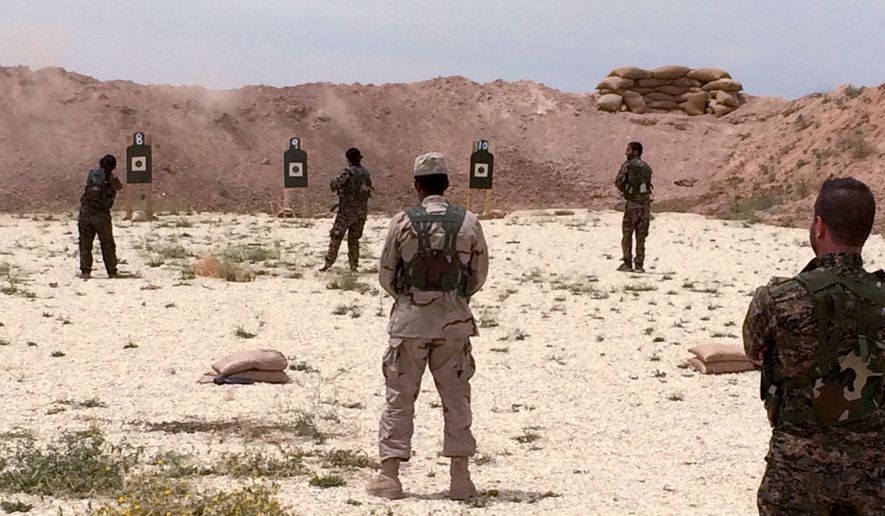The Pentagon insisted Thursday that U.S. forces in Syria and elsewhere in the region remain in noncombat roles despite reports that they are fighting alongside Syrian front-line troops in their push to retake the Islamic State group’s capital in Raqqa.
In an terse exchange with reporters Thursday, Pentagon spokesman Peter Cook defended the Defense Department’s claim that American special operations forces were not engaged in combat in Syria.
“They are in an advise-and-assist mission,” Mr. Cook said. “They are not on the front lines.”
Mr. Cook made the comments shortly after Agence France-Presse published pictures of U.S. special operations forces fighting 22 miles outside of Raqqa alongside rebels who belong to the Syrian Democratic Forces.
The images show U.S. special operations forces traveling in civilian pickup trucks outfitted with grenade launchers and heavy machine guns, and conducting patrols alongside Syrian troops in the village of Fatisah.
Reports say Syrian and Kurdish forces have begun slowly retaking territory in and around Raqqa in preparation for the final assault on the Islamic State stronghold.
With an invasion of Raqqa looming, international peace talks to end the civil war between anti-government militants and forces loyal to Syrian President Bashar Assad are facing more delays.
Staffan de Mistura, the United Nations envoy for Syria, briefed members of the Security Council on the peace talks Thursday and afterward told reporters that he hoped to resume negotiations as soon as possible. He gave no specific date.
Samantha Power, U.S. ambassador to the United Nations, blamed Russia’s military support to the Assad regime as a main hurdle in the peace process.
At the Pentagon, Mr. Cook declined to comment on whether the entire contingent of 250 U.S. special operations trainers ordered by the White House into Syria in May are on the ground, but he acknowledged that the American presence in the country has escalated from the first deployment of 50.
The Pentagon has repeatedly maintained that U.S. troops supporting local forces against Islamic State militants are stationed well behind the front lines and are not directly involved in ground combat operations.
The assertions are in line with President Obama’s statements that he has ended any direct U.S. combat role in the Iraq and Syrian conflicts.
But as the fight to drive the Islamic State from Iraq and Syria heats up, it has been increasingly difficult for the administration to deny that U.S. forces are playing a larger role in combat operations in both countries.
Navy SEAL Charles Keating IV was killed during a massive Islamic State assault this month on Kurdish peshmerga forces in Iraq, north of the Islamic State-held city of Mosul.
Local reports from Libya say U.S. special operations teams have been seen training local fighters and conducting patrols near the cities of Misurata and Benghazi. The Islamic State has established a major outpost centered on the Libyan city of Sirte.
• Carlo Muñoz can be reached at cmunoz@washingtontimes.com.




Please read our comment policy before commenting.